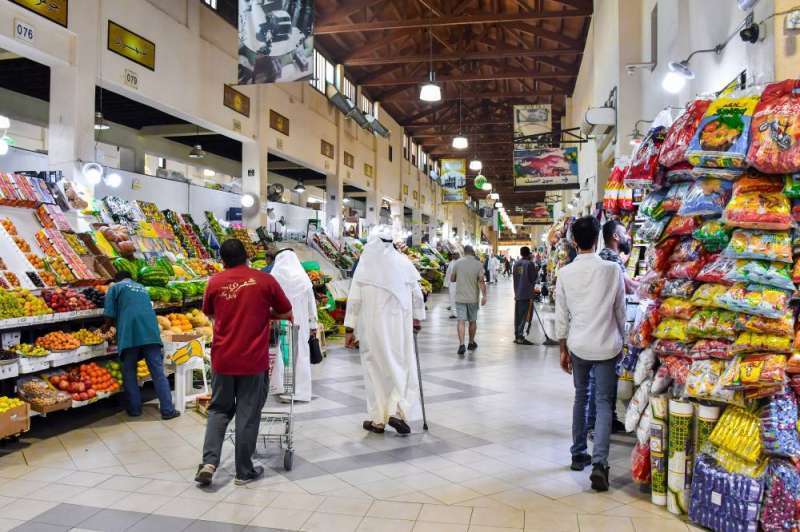Latest News
- Kuwait-Jordan Durra Field Joint Statement Rejected By Iran
- GTD Cracks Down On Vehicle Noise Pollution In Sulaibiya
- Mystery Of Dead Fish At Shuwaikh Beach Sparks Urgent Action
- MEW To Complete Links With The Interior And Justice Ministries B...
- 8 Expats Jailed For Bribing An Officer To Obtain Driver's Licens...
- Weekend Weather Is Expected To Be Hot
- From Tomorrow, Traffic Diversion On Third Ring Road
- Ministry Of Health Refute Rumors On Non-availability Of Antibiot...
- Amir Of Kuwait And Jordan King Renew Commitment To Regional Secu...
- 37 Arrested With Narcotics And Firearms
- Outrage Over Candidate's Arrest
- Six Stores Shut Down In Jahra For Selling Fake Goods
Kuwait Has The Cheapest Basic Foodstuffs In The Gulf

Kuwait ranks lowest among Gulf Cooperation Council (GCC) countries in terms of food prices, according to official statistics. Economic sources attribute this success to successful management of the food security dossier and policies to mitigate inflation pressures, as well as monitoring market conditions. As a result of the subsidy system and the non-application of a value-added tax, this has contributed to preserving citizens' purchasing power and limiting the impact of rising food and energy prices.
The Technical Department of the Advisory Committee for the Supervision of Goods and Pricing, affiliated with the Ministry of Commerce and Industry, published an official statistical report in September of the previous year that compared Kuwait's average prices with those of the Gulf countries. Several goods, such as rice, flour, poultry, children's dietary supplements, and canned goods, were found to be the cheapest in the Gulf. When compared to neighboring countries, other food prices in Kuwait are within acceptable ranges.
In addition, the report noted that the rising global demand and shipping costs have led to an increase in basic food prices. A 27% increase in global food prices was reported by the Food and Agriculture Organization (FAO), primarily due to higher prices for grains, vegetable oils, dairy products, and sugar. Several countries have also experienced shortages of food.
Food import-dependent countries are under further pressure as a result of the global price increase. It is expected to lead to increased inflationary pressures on food prices, prompting the need for several recommendations, including:
- To ensure that goods are available in the country before global prices rise, new storage facilities will be built.
- Providing benefits to state-owned cooperative societies and stabilizing electricity and water prices.
- Increases in state food import fees should be halted.
- Provision and recruitment of professional and skilled labor on the local market.
- Import procedures should be streamlined and land, sea, and air ports should be opened to goods, such as opening the Al Abdali border to Turkish meat imports.
- Increasing trade and investment agreements in the food and animal resources sectors.
- Increasing foreign agricultural investment and diversifying crops.
- A two-year waiver of customs duties and service fees, as well as fees for the release of essential food items.
- Increasing the number of goods exempt from fees.
- Enhancing and expediting customs facilities.
- Assess any new customs duties or taxes that could increase local prices, such as excise taxes.
- A delay in implementing the value-added tax until global food prices stabilize.
- Two-year suspension of port fees on imported food shipments.
The government has recently taken several measures to control the price of essential goods and protect them from global inflation. One of the most prominent measures is the enhancement of strategic reserves of food items. A number of decisions have been issued in this regard by the Minister of Commerce and Industry, Mohammed Osman Al-Aiban. A permanent committee will be formed to regulate the categories of rationed items, strategic storage areas will be set up for the creation of warehouses and depots, and a committee will be formed to develop mechanisms for preserving food and commodity reserves. In addition to studying the existing mechanisms for preserving food and commodity reserves, this committee will prepare a comprehensive plan for developing these mechanisms and raise awareness of the need to reduce food consumption and waste.
Get The Latest and important news on our Telegram Channel click here to join
Trending News
-
 Kuwait Implements Home Biometrics Services Ahead O...
14 April 2024
Kuwait Implements Home Biometrics Services Ahead O...
14 April 2024 -
 Kuwait Airways Provides Update On Flight Schedule...
14 April 2024
Kuwait Airways Provides Update On Flight Schedule...
14 April 2024 -
 Kuwait Airways Introduces Convenient Home Luggage...
15 April 2024
Kuwait Airways Introduces Convenient Home Luggage...
15 April 2024 -
 Expat Residency Law Amended By Kuwait Ministerial...
20 April 2024
Expat Residency Law Amended By Kuwait Ministerial...
20 April 2024 -
 Two Expats Are Arrested For Stealing From Salmiya...
17 April 2024
Two Expats Are Arrested For Stealing From Salmiya...
17 April 2024 -
 Kuwait Airways Resumes Flights To Beirut And Oman...
15 April 2024
Kuwait Airways Resumes Flights To Beirut And Oman...
15 April 2024 -
 Temperature Increases Cause Electricity Load Index...
21 April 2024
Temperature Increases Cause Electricity Load Index...
21 April 2024 -
 Thief Returns Stolen Money With An Apology Letter...
15 April 2024
Thief Returns Stolen Money With An Apology Letter...
15 April 2024 -
 3 Expats Caught In Salmiya With 213 Bottles Of Loc...
23 April 2024
3 Expats Caught In Salmiya With 213 Bottles Of Loc...
23 April 2024 -
 Ministry Of Interior Denies Social Media Rumors Re...
13 April 2024
Ministry Of Interior Denies Social Media Rumors Re...
13 April 2024












Comments Post Comment